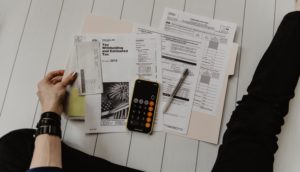Capital Gains Tax
An uncomplicated guide to a complicated thing

Selling assets is never a simple task. One of the reasons it is so complicated is Capital Gains Tax, but don’t worry – we’re going to walk you through a brief outline of what it is and what it might mean for you.
The Basics
Capital Gains Tax – CGT – is a tax on the profit you make when you sell something which has increased in value. It applies to property, shares and investments, cryptocurrency (e.g. Bitcoin), collectables and personal use assets above a specific value. It’s not charged on things such as your main residency, a car or motorcycle, or any depreciating assets.
For basic rate tax payers, CGT is charged at 10% on assets, and 18% on property. For higher or additional-rate taxpayers it’s 20% on assets and 28% for property. Recent changes following the announcement of the 2020 Budget mean that, as of the 6th April, you now have to report and pay CGT within 30 days if you sell residential property.
Calculating Capital Gains Tax
To work out if you’ll need to pay CGT on the sale of an appreciating asset, you need to work out the gain for each asset (or your share of the asset) and do this for all personal possessions, shares, property or business assets that you have disposed of in the tax year. Then add the gains from each asset together and deduct any allowable losses (for example, expenses).
If the total gains fall under the tax-free allowance, then you won’t have to pay Capital Gains Tax. Straightforward, right?
So, for this tax year (2020/21), the annual exempt amount is £12,300 (up from £12,000 in the previous tax year) for individuals and £6,150 (up from £6,000) for trusts. There is an opportunity here to be efficient and structure the disposal of your assets if you haven’t used the full allowance from the previous financial year.
Selling Property
One of the most common assets CGT is charged on is the sale of property and land. If HMRC has ruled that the property you are selling isn’t your main residence then you will have to pay the CGT. If you are selling your main home you shouldn’t usually pay any CGT. However, there are some circumstances where it does apply. These include:
- If your home includes land/additional buildings of 5000 square metres or more
- If you have sub-let part of it
- If you have used part of the house for business
- If you bought the house to make a profit from it
- If you have more than one home that could be considered your main residence
If the property has been gifted to you from your spouse or civil partner, and represents a genuine gift then CGT will not be charged.
For people who have inherited property or land, CGT is not payable until you decide to sell it on.
We have only given a handful of simple examples to demonstrate the basics of CGT. If you are looking at selling assets, or need advice on planning the sale of a property, Ten Forward Finance can help you. Call us!






